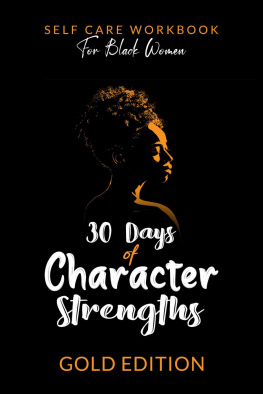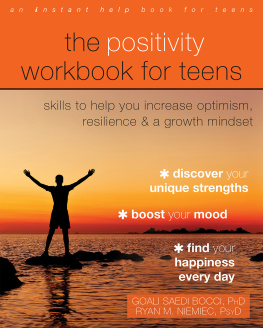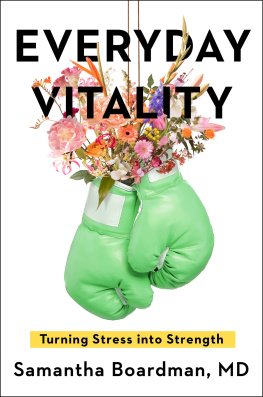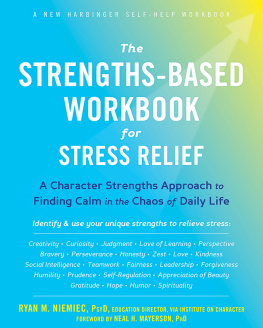Also by GOLD EDITION
SELF - CARE
Emotional Self Care for Black Women: Powerful Prompts to Manage Emotions, Raise Your Self-Esteem, Cultivate Well-Being, Quiet Your Inner Critic, And Achieve Your Goals
Self-Care Workbook for Black Women: Change Your Habits In 30 Days: Small Daily Changes for Physical Energy, Mental Peace, And Peak Performance
Emotional Self Care for Black Women: 12 Months of Self-Help Activities to Add to Your Self-Care Plan
Self-Care Workbook for Black Women: 30 Days of Character Strengths
Motivational Interview in Nutrition, Food and Activity: Learn How to Set Goals to Motivate Yourself for The Next 12 Months and Beyond
Self-Care Workbook for Black Women: 4 Books to Help You Increase Self-Esteem and Reprogram Old Habits In 30 Days to Become the Unstoppable, Confident You
S elf  C are
C are
WORKBOOK
for
Black Women
30 DAYS OF CHARACTER STRENGTHS
A Guided Practice to Ignite Your Best
Take time for yourself

GOLD EDITION
Taking care of EMOTIONS is
GOOD AND RIGHT, but how do you do it?
 OUR WELL-BEING comes from what we do every day, from small daily gestures, from the habits that make up our "LIFESTYLE".
OUR WELL-BEING comes from what we do every day, from small daily gestures, from the habits that make up our "LIFESTYLE".
T aking care of yourself is helpful in fighting stress and increasing your overall well-being. It is especially important when you have to cope with numerous responsibilities every day. A good way to take care of yourself is to learn what your mental, physical, and professional needs are.
Knowing how to recognize your needs and prioritize yourself when needed will allow you to more effectively address not only your needs, but also those of the people around you.
Copyright 2021 
GOLD EDITION
All rights reserved.
No part of this guide may be reproduced in any form without permission in writing from the publisher except in the case of brief quotations embodied in critical articles or reviews.
Legal Notice : This book is copyright protected. It is only for personal use. You cannot amend, distribute, sell, use, quote or paraphrase any part, or the content within this book, without the consent of the author or publisher.
CONTENTS
When being of color is combined with being a woman, discrimination is even more complex and interconnected.
 A fter the murder of George Floyd, racism is back as the hot topic on the front pages of newspapers, but there is always too little talk about how the issue is closely intertwined with that of gender.
A fter the murder of George Floyd, racism is back as the hot topic on the front pages of newspapers, but there is always too little talk about how the issue is closely intertwined with that of gender.
Black women are discriminated against twice: in Afro-descendant communities as women, and in feminist circles as black.
But the difficulties faced by women of color are not found only within their own communities of origin. Being black and carrying on your own battles for emancipation is not easy even in feminist circles. When, in those environments, we talk about the battles of black bodies, it is often done with extreme simplification, even if in recent years there has been more attention and we have seen some glimmer of progress.
When you are born in a country having a color other than that considered "normal" and you are also a woman, you spend a good part of your life trying to shake off the prejudices that are attached to both categories.
In my teens, I started looking for models to refer to, but I couldn't find any kind of representation in magazines that spoke to me. Also, because the reference standard was Kate Moss.
There are girls, like influencer Sandra Lambeck, who resort to lightening creams and, as crazy as it may seem, I understand the pain that leads you to do something so extreme: you not only want to be considered beautiful but also "normal".
Your skin color is a problem when it is never taken into consideration, ergo it is not the norm.
You might think things have improved, but the reality is that it's still hard to find a black woman on the cover of a magazine. It is a rarity and this obviously suggests that even today we do not have the same level of representation.
The hair issue is even more complex: I often found myself having to give justifications why I didn't wear my natural hair loose.
If you are a woman and black you have to work twice as much as others and you are almost always forced to raise your voice more than anyone else just to be heard.
So, the time has come to listen to yourself, to take care of your body, your mind and your spirit. The time has come to truly be yourself, to accept your body beyond the social standards of reference. The time has come to accept yourself beyond what your family members, your co-workers, your children, expect of you. Look in the mirror and accept who you are, who you really want to be and enjoy your life.
Sometimes the evening comes and we feel drained of energy, dissatisfied and with the feeling that we have not done anything important during the day.
Friends, couple relationships or work are extremely important in our life. Yet often all of these relationships or activities overshadow ourselves.
Taking care of yourself doesn't mean being selfish. On the contrary, giving priority to our well-being means not only improving the quality of our life but also coping better with our social and working relationships. Learning to know one's needs helps us, in fact, to feel freer and to be able to seize all those opportunities that can make us feel better.
Despite this, many often confuse putting ourselves first with selfishness, as if our well-being and altruism were not equally important or mutually exclusive. Not only is it a totally false idea, but it is also an idea that can seriously compromise our well-being.
Forgetting about yourself










 C are
C are

 OUR WELL-BEING comes from what we do every day, from small daily gestures, from the habits that make up our "LIFESTYLE".
OUR WELL-BEING comes from what we do every day, from small daily gestures, from the habits that make up our "LIFESTYLE".



 A fter the murder of George Floyd, racism is back as the hot topic on the front pages of newspapers, but there is always too little talk about how the issue is closely intertwined with that of gender.
A fter the murder of George Floyd, racism is back as the hot topic on the front pages of newspapers, but there is always too little talk about how the issue is closely intertwined with that of gender.